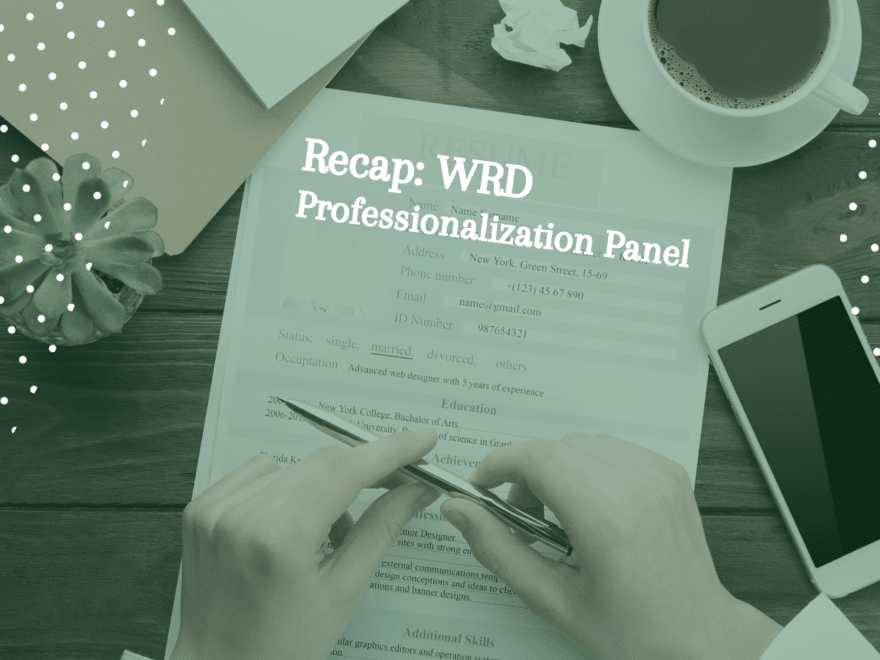Last quarter, WRD”s Student Community Committee hosted a Professionalization Panel for students to hear from WRD graduates who work as professional writers about their lives post-graduation. As Dr. Michael Gallaway, who facilitated the panel shared, “The goal is to talk about what life is like after you leave DePaul and after you have received your degree from the WRD Department, including what kind of things you might be doing and some of the intricacies of professional writing jobs.”
WRD undergraduate and graduate students joined the panel on Zoom, which included three speakers: one DePaul Career Center staff member and two MAWRD alumni.
First, Ed Charles from DePaul’s Career Center joined to speak with students about available resources post-graduation. He emphasized the effectiveness of digital resources, meeting with career counselors, and using tools like DePaul’s Alumni Sharing Knowledge network. In addition, Ed advised students to start figuring out what aspects of current courses are most intriguing to them, and to look for job descriptions that include overlapping language. For example, students in Dr. Lisa Dush’s Content Strategy course may include user experience research and content writing, two elements of the course, into searches for job descriptions as they seek out professional writing jobs.
In addition, Chicago-based writer, editor, fundraiser and BA-MA WRD graduate Riley Yaxley joined to share about their experience in the professional writing world, particularly in the nonprofit section. Riley is currently the Resource Development Manager for the National Performance Network, an editor for 60 Inches from Center and a consultant for the Joan Mitchell Center. They previously held positions at the Art Institute of Chicago, the Museum of Contemporary Art. Riley’s writing has appeared in numerous publications, and touches on themes including queerness, motherhood, memory, and many more.
Finally, WRD graduate Kate Fabsik, a technical writer for Motorola Solutions, shared about her experience working with company manuals and learning intricate software as part of the writing process. Her current work focuses on creating, updating and reviewing manuals of all sizes and at all stages of completion, and in oing so, she works with subject matter experts, other writers, and product managers to ensure that the manuals are as accurate and usable as possible. (She also generously offered to extend conversations about technical writing with any students who are interested and able to reach out to her through her LinkedIN profile.)
Beyond the Career Center resources and WRD’s Career Resources, Riley and Kate shared current and holistic perspectives on their respective work as professional writers, and how WRD helped them get to where they are today. In Riley’s case, courses that focused on proposal and grant writing have provided valuable knowledge for their current role in nonprofit fundraising. Dr. Monica Reye’s Course Feminist Rhetorics also informed their perspective on advancing equity through language, something they now focus on in their daily work. For Kate, opportunities to try out different courses and projects led to her current work-life balance, where she is able to both excel in her technical writing work and still make time to write creatively on a regular basis.
Both Riley and Kate emphasized the importance of fostering this balance at every stage of the professional writing career. As Riley emphasized, it’s more important to be part of an organization with a healthy culture than to strive for the biggest names in the industry. In fact, it may even be more beneficial to one’s career in the long run. Kate encouraged students to maintain things that bring them joy outside of work, and also to get connected within the workplace that make the time seem more meaningful. For example, Kate has been participating in an ASL affinity group connected to her workplace at Motorola.
Careers in professional writing – from fundraising to manual writing and beyond – are vast, and often involve diverse skills that WRD seeks to foster in students! The Student Community Committee plans to continue hosting similar events to help bolster students’ success and to illustrate how useful a degree in WRD can be for many different career paths.
For additional professional resources, visit the WRD Blog’s Academic and Professional Resources Page.
Watch the full recording of the panel here. Password: &?i%F!Q9
